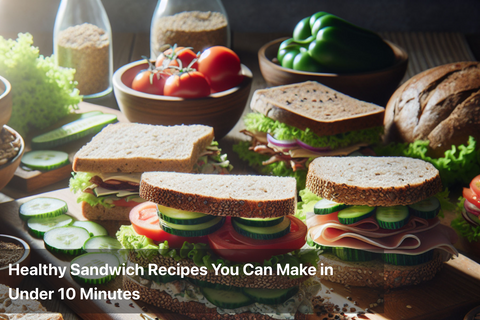
How to make sprouts at home?
Sprouting is an exciting and rewarding process that can significantly enhance your diet. By learning how to make sprouts at home, you not only gain access to fresh and nutrient-rich greens but also save money compared to store-bought options. The nutritional value of sprouts is impressive; they are rich in vitamins, minerals, and enzymes that can boost your overall health.
Sprouts are easy to digest, making nutrients more accessible for your body. They are also low in calories and can add a satisfying crunch to salads, sandwiches, and smoothies. Plus, you'll enjoy the satisfaction of growing your own food, which fosters a deeper connection to what you eat.
Creating sprouts at home is a straightforward process. With just a few seeds, some water, and a bit of patience, anyone can cultivate these tiny nutritional powerhouses. It’s a cost-effective solution—often, a small packet of seeds can yield a large quantity of sprouts, stretching your dollar further.

Choosing the Right Seeds for Sprouting
When embarking on your sprouting journey, selecting the right seeds is crucial. Various seeds possess unique qualities and nutritional profiles, making them suitable for different tastes and dietary needs.
-
Mung beans stand out as one of the most popular choices. They're rich in protein, fiber, and vitamins A and C. Their mild flavor complements both salads and stir-fries beautifully.
-
Lentils are another excellent option, packed with iron and folate, making them great for boosting energy and supporting overall health.
-
Alfalfa seeds are highly regarded for their nutritional density, containing vitamins K, C, and several B vitamins. They sprout quickly and offer a crunchy texture, perfect for sandwiches and salads.
-
Other noteworthy seeds include broccoli, known for its cancer-fighting properties, and radish seeds, which add a spicy kick to your dishes while offering vitamin C and antioxidants.
-
While exploring how to make sprouts step by step, remember that not all seeds are appropriate for sprouting. Some must be soaked before consumption, while others, like wheat or corn, are not suitable for sprouting at all.
-
Choose seeds specifically labeled for sprouting to ensure safety and success. This careful selection can lead to diverse and nutritious sprouts, making your home sprouting endeavor both enjoyable and beneficial.
Step-by-Step Guide to Making Sprouts at Home
-
Rinse: Begin by rinsing a quarter cup of seeds under cool, running water. This step is crucial to remove any dust or impurities.
-
Soak: After rinsing, transfer the seeds to a bowl and cover them with water. Let them soak for 6 to 12 hours, depending on the seed type. For instance, mung beans benefit from a longer soaking period.
-
Drain: Once soaking is complete, drain the water thoroughly using a fine-mesh strainer.
-
Rinse Again: Rinse the drained seeds with cool water to keep them moist.
-
Sprouting: Place the seeds in a jar, mesh lid, or a sprouting tray, ensuring they have enough space to spread out. Keep the jar tilted to allow excess water to drain and air to circulate.
-
Water Daily: Rinse and drain the seeds twice each day for about 3 to 5 days.
-
Harvesting: When the sprouts reach 1 to 2 inches in length, they’re ready to eat. Store them in the refrigerator and enjoy their fresh crunch!
Tips and Tricks for Successful Sprouting
|
Tip/Trick |
Description |
|---|---|
|
1. Choose Fresh, High-Quality Seeds |
Use organic, non-GMO seeds labeled for sprouting. Ensure seeds are fresh for higher germination rates. |
|
2. Rinse Seeds Thoroughly |
Rinse seeds well before starting to remove any dust or residues that may affect germination. |
|
3. Use the Right Container |
Use a wide-mouth jar or sprouting tray with good airflow and drainage to prevent mold growth. |
|
4. Soak Seeds Before Sprouting |
Soak seeds for 6-12 hours to soften the seed coat and speed up germination. |
|
5. Keep Seeds Moist, Not Soaked |
Rinse and drain seeds 2-3 times a day to keep them moist but not soggy. |
|
6. Maintain the Right Temperature |
Keep sprouts at room temperature (65-75°F / 18-24°C) for optimal growth. |
|
7. Provide Proper Light |
Expose sprouts to indirect sunlight for a few hours a day to encourage healthy growth. |

DIY Sprouts: How to Make This Nutrient-Packed Item at Home
Making sprouts at home offers numerous advantages that contribute to a healthier lifestyle. First, it's a cost-effective option compared to buying pre-packaged sprouts. You can grow a variety of sprouts right in your kitchen, ensuring you have fresh produce at your fingertips. Nutritionally, sprouts are packed with vitamins, minerals, and enzymes that enhance digestion and absorption of nutrients. Incorporating them into your diet can lead to improved overall health.
Experimenting with different seeds allows for a greater diversity of nutrients, making your meals not just healthier but also more interesting. As we’ve discussed, learning how to make sprouts at home is straightforward and rewarding. By following a step-by-step approach, you can easily succeed in sprouting various seeds.
As you discover the joy of home sprouting, you’ll appreciate the benefits firsthand. It’s a small effort that yields significant results. Finally, consider integrating sprouts into your daily meals—add them to salads, sandwiches, or smoothies for an extra boost of health. Your body will thank you for including this nutritious powerhouse in your routine.
This Blog post is an initiative by Lo! Foods, to provide accurate and Nutritionist / Doctor approved information related to Health. Lo! Foods is India's leading brand for Everyday Functional Foods. Foods designed for specific Health conditions or Needs. Lo! Foods also runs India's largest range of Low Carb Healthy Cloud Kitchens, under the brand names of Lo!, ProteinChef, ATH (All Things Healthy) and DiabeSmart.









Leave a comment
Your email address will not be published.